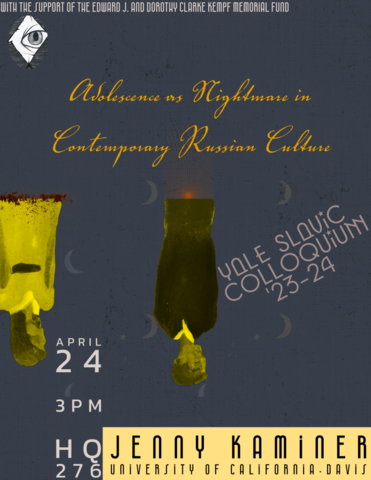As part of the Slavic Colloquium, Prof. Jenny Kaminer (University of California, Davis) will present “Adolescence as Nightmare in Contemporary Russian Culture” on April 24 at 3pm in HQ 276.
Jenny Kaminer is an interdisciplinary scholar of Russian culture whose publications have encompassed a broad range of historical epochs—from the nineteenth century to the present day—as well as genres and media, including, drama, prose, film, and television. Kaminer established her reputation within the field of Slavic Studies as a specialist in gender and Russian culture, the representation of maternity in particular. Her first book, Women with a Thirst for Destruction: The Bad Mother in Russian Culture (Northwestern UP, 2014), received the Heldt Prize for Best Book in Slavic/East European/Eurasian Gender Studies.
Her latest book, Haunted Dreams: Fantasies of Adolescence in Post-Soviet Culture (Cornell University Press, 2022) is the first comprehensive study in English devoted to cultural representations of adolescence in Russia since the end of the Soviet Union in 1991. It is also the first book-length study to situate these post-Soviet cultural representations within the broader context of European and Anglo-American scholarship on adolescence and youth. Through close analysis of prose, drama, television, and film, this book maps how the adolescent hero has become a locus for multiple anxieties, as well as a background for the projection of fervent hopes, throughout the tumultuous years since the end of the Soviet experiment.
About the Slavic Colloquium:
The war in Ukraine has precipitated many troubling inquiries for scholars of Russian, East European, and Central Asian studies. The tragedy has led to a critical reassessment of the scope and extent of our scholarly endeavors, and the adequacy of our contributions both as academics and as engaged individuals. Despite diverse methodologies we grapple with similar questions about the limitations of our disciplines, the (ir)relevance of our epistemologies, and the ways we could or should read our sources after February 2022—against or with the grain. Many scholars have called for new concepts and frameworks capable of redressing inadequacies and injustices. The Slavic Colloquium ‘23-24 approaches these challenges as an opportunity to redefine the contours of our field and rethink the nature and scope of our inquiries. It seeks to be a forum for dialogue, exploration, and critique, featuring the insights of thinkers whose research probes the boundaries of Russian, East European, and Central Asian literary and historical studies, as well as the humanities at large. The array of topics that we will address this year is exceptionally broad, ranging from rewilding initiatives in Siberia to queer aesthetics in Central Asia and post-Soviet adolescents. Our invited speakers will discuss, among other themes, racial biopolitics in the Russian Empire sleeplessness in Nabokov and Proust, and Ukrainian anti-war literature. In addition, the Colloquium of 23-24 will feature the launch of two extraordinary books: I love Russia: Reporting from a Last Country by Russian journalist Elena Kostiuchenko, and Insulted, Belarus by Belarusian playwright Andrei Kureichik.
The colloquium is organized by the Department of Slavic Languages and Literatures, with the support of the Edward J. and Dorothy Clarke Kempf Memorial Fund. Co-sponsored by Russian, East European, and Eurasian Studies & East Asian, Studies at the MacMillan Center; Anthropology; History of Art; Whitney Humanities Center of History; French.

Slavic Colloquium | Jenny Kaminer
Event time:
Wednesday, April 24, 2024 - 3:00pm to 5:00pm
Location:
Humanities Quadrangle, 276
320 York Street
New Haven, CT
06511
Speaker/Performer:
Prof. Jenny Kaminer (University of California, Davis)
Event description:
Admission:
Free

